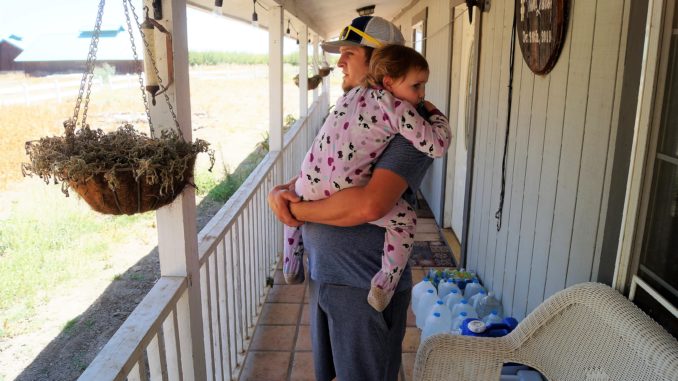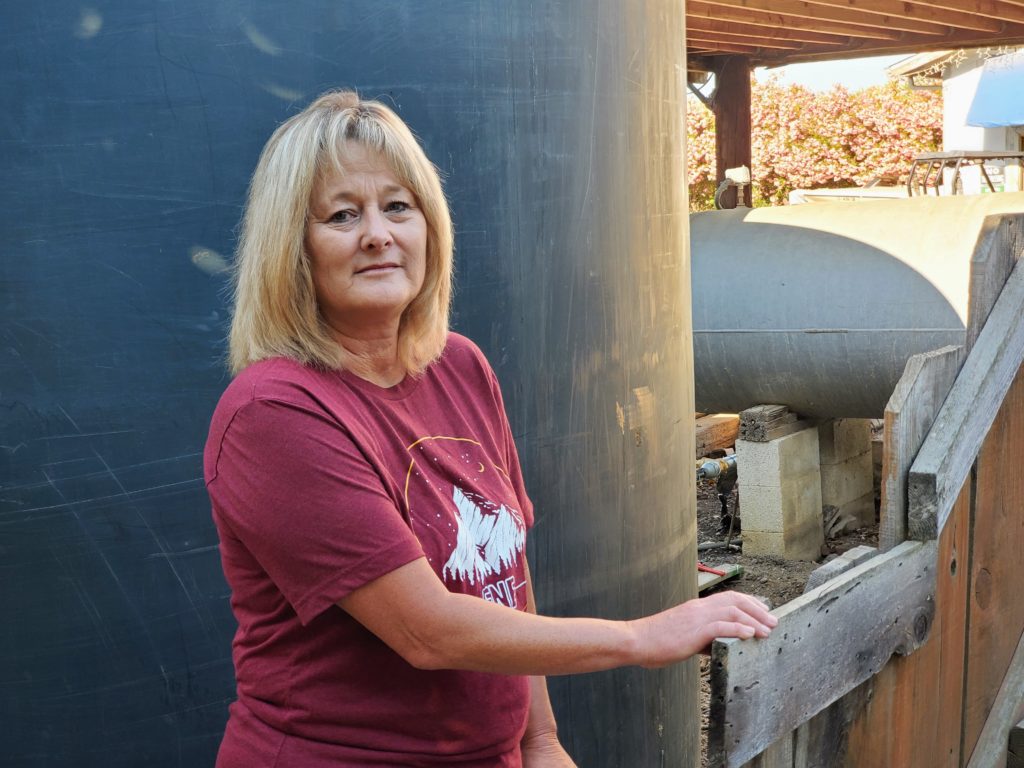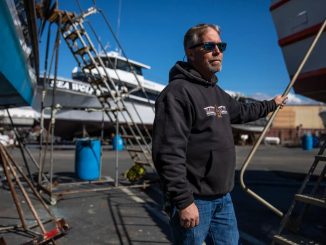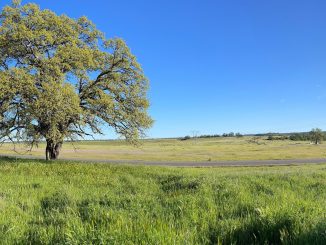
This story originally appeared in The Sacramento Valley Mirror.
Staci Buttermore and her family are carrying the weight of California’s water crisis across their property in 5-gallon buckets.
In the week since the domestic well went dry at their 30-acre family ranch southeast of Orland, they’ve been spending their waking hours hauling water from town and from their agricultural well, for basics such as doing the dishes, taking showers and flushing the toilet.
Buttermore worries that their agricultural well could run dry next.
“My family has told me, no more crying, because I’m just dehydrating myself,” she said.
California’s water crisis is accelerating quickly in Glenn County. At least 34 domestic wells have gone dry in unincorporated areas of the county between February and the first few days of June, many of them in the vicinity of Orland, according to data compiled by county officials.
After another dry spring, water levels in the state’s reservoirs are 50 percent lower than normal, and mountain snowpack disappeared two months ahead of schedule, according to research cited by online news publication Axios, warning that California is in for a “nightmare summer.”
In another indication of wells going dry, Orland city officials say they’ve been contacted by a dozen property owners in recent weeks, primarily in the east and south areas of town, about going through the process of connecting to city water. Four have been hooked up so far.
The Orland City Council is set to consider a resolution declaring a local state of emergency due to the drought at its meeting tonight (June 7). The resolution would ask the state to waive regulations and release funding to aid local drought response and recovery.
Glenn County’s Board of Supervisors approved a similar state of emergency at its June 1 meeting, and formed an ad hoc drought task force to coordinate the county’s response.
Supervisors are scheduled to consider a proposed moratorium on new agricultural wells at their June 15 meeting, similar to one the board implemented from August 2015 to August 2016.
“I don’t ever remember it being this bad, this early,” said Glenn County Supervisor Grant Carmon, in an interview last week.
Carmon represents District 1, including areas around Orland. He was appointed to the county’s drought task force along with Supervisor Tom Arnold, who represents District 3, including unincorporated areas of Glenn County south of the Orland city limits.
Carmon has experienced the challenges of the drought at his own property, where he has 7-and-a-half acres of olives. The water table has dropped to the point that his current well pump isn’t strong enough for the task, requiring it to be replaced and lowered at significant cost.
In the short term, Carmon said he hopes the task force can oversee the creation of a “one-stop shop,” such as a website or phone number for those impacted by the drought to get information about steps they can take to get help, water deliveries, and financial assistance.
“We’re trying to get some help on the way,” he said.
The task force also will include other officials from the region. Orland city staff is recommending that the City Council designate City Manager Pete Carr to serve on the task force.
The city of Orland is able to sell water at established rates from its well at the Orland Haigh Field Airport. During the previous drought, for example, the city had someone show up with a tank on a pickup truck bed to get water. Carr said the city expects to offer that option again.
The potential for the Board of Supervisors taking action on wells appears to have contributed to a jump in permit applications from property owners seeking to get in under the deadline.

Glenn County has received applications for 39 new agricultural wells from property owners in recent weeks, said Don Rust, Planning and Community Development Services director, via phone.
Prior to that, 55 agricultural well permits had been approved all year, according to data presented by the Environmental Health Department at the June 1 supervisors meeting.
The cost of drilling a deeper well can run from $30,000 to $50,000, according to figures discussed during the Board of Supervisors meeting.
The other challenge is the backlog of work for well-drilling, with some estimates stretching out to the fall before work can begin.
That’s too long for Matthew Quinley and his family. They have been without running water for nearly two weeks after the well at their rented home southeast of Orland went dry. They are relying on jugs of water that they fill from a tank brought in by the property owner.
Quinley grew up in a hunting family in Willows, so he’s accustomed to going without running water, and was initially prepared to stick it out for as long as two months.
But with three kids, including two toddlers and a teenager, they’ve come to the realization that they need to find a new place. The family is considering a move to Oregon.
“We can do a couple months, but we’re not doing six months,” he said.
The water shortage is also impacting businesses in the area. At Valley Rock Products, the longtime local sand-and-gravel supplier and concrete company on Highway 32 east of Orland, one 100-foot well recently became effectively unusable.
Bill Graham, the general manager at Valley Rock for the past 30 years, said he can’t remember a time when this happened before, particularly not to this extent, at this time of year.
Graham said he’s concerned not just for the company but for everyone in Glenn County.
“Wells are drying up almost daily now,” he said.
The well at Valley Rock is not totally dry, but the water draws down so quickly that it’s not feasible to pump, Graham said. As of last Thursday, he said the company had been able to manage the situation without reducing its production volumes.
Valley Rock is looking at the possibility of drilling a new well, the timing of which is uncertain at this point given the backlog for well-drilling. The company also is investigating the possibility of using storage tanks to build up its water reserves.
Renting a large water storage tank has been part of the solution so far for Staci Buttermore and her family at their ranch outside of Orland, which has been in their family for more than 50 years. The property consists primarily of pistachio trees, with some orange trees as well.
As of last week, they were working to pressurize the tank to serve their house.
Their domestic well is 95 feet, and the recommendations they’ve received would be to drill a new well in the range of 260 feet to 300 feet to tap into the groundwater supply, she said.
The existing well would need to be filled in, which is causing a dilemma given that a new one couldn’t be drilled until October or November, based on current backlogs.
Short term, Buttermore said she hopes officials can reduce the regulations and red tape needed to get a new well, and set up ways for people whose wells have run dry to easily retrieve water.
Long term, she hopes to see a substantial increase in the state’s water storage capacity, such as the long-awaited Sites Reservoir. First proposed in the 1980s, the project in Colusa and southwestern Glenn County is still three years from the start of construction and decade from completion, according to a timeline presented to the Board of Supervisors in early April.
Buttermore acknowledged the entrenched and sometimes conflicting interests among different people and groups impacted by the water crisis, but said she hopes the community can set those differences aside in the interest of finding real long-term solutions.
In the meantime, she and her family will be hauling water.
“We love to camp,” she said. “But this is pretty rough.”
Todd Bishop is a Seattle-based business and technology journalist, and co-founder of the online news publication GeekWire. A native of Orland, he volunteers for The Sacramento Valley Mirror. Reach him at todd@geekwire.com.




Be the first to comment